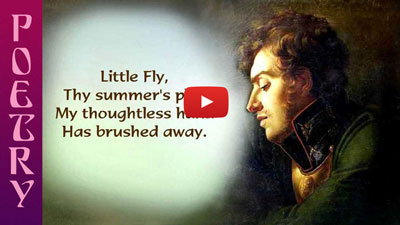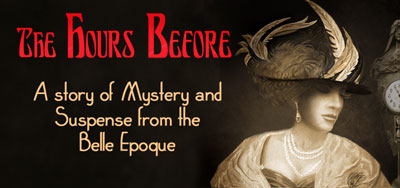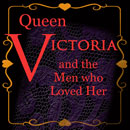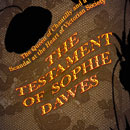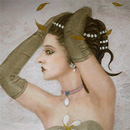A moment of reflection and understanding
Transcript
Little Fly,
Thy summer's play
My thoughtless hand
Has brushed away.
Am not I
A fly like thee?
Or art not thou
A man like me?
For I dance
And drink, and sing,
Till some blind hand
Shall brush my wing.
If thought is life
And strength and breath
And the want
Of thought is death;
Then am I
A happy fly,
If I live,
Or if I die.
Thy summer's play
My thoughtless hand
Has brushed away.
Am not I
A fly like thee?
Or art not thou
A man like me?
For I dance
And drink, and sing,
Till some blind hand
Shall brush my wing.
If thought is life
And strength and breath
And the want
Of thought is death;
Then am I
A happy fly,
If I live,
Or if I die.
Insights, themes and ideas for interpretation
● The poet takes a moment to consider his spontaneous and unthinking action of killing a fly.
● It appears in a collection entitled ‘Songs of Innocence and Experience’ published in 1794, and if it seems more than a little mystical in tone we should not be surprised, due to the poet’s regular mystical visions and meditations.
● In a moment of introspection and understanding, it occurs to him that the fly is a living creature like himself, and has its own unique existence - a life that, to the fly, might seem equally as important as the poet’s life seems to him.
● The poet, realising that he too lives much of his life in a self-centred, creature-like existence (also dances, drinks and sings), concludes that at such times he might be no better or worse than the humble fly. He is equally as vulnerable – unaware of things that might be greater and more powerful than himself.
● By considering the commonality between all living things, the implications of even our most insignificant deeds must be recognised (a view expressed in many mystical or religious teachings - as well as being quite a modern idea in terms of environment and conservation).
● The poet also reflects that the very process of contemplating this idea, the process of thinking, is a sign of life, and that, on the other hand, death would perhaps be a state without thought and, therefore, without sorrow. He is happy, therefore - 'a happy fly' - if he lives or if he dies.
● It appears in a collection entitled ‘Songs of Innocence and Experience’ published in 1794, and if it seems more than a little mystical in tone we should not be surprised, due to the poet’s regular mystical visions and meditations.
● In a moment of introspection and understanding, it occurs to him that the fly is a living creature like himself, and has its own unique existence - a life that, to the fly, might seem equally as important as the poet’s life seems to him.
● The poet, realising that he too lives much of his life in a self-centred, creature-like existence (also dances, drinks and sings), concludes that at such times he might be no better or worse than the humble fly. He is equally as vulnerable – unaware of things that might be greater and more powerful than himself.
● By considering the commonality between all living things, the implications of even our most insignificant deeds must be recognised (a view expressed in many mystical or religious teachings - as well as being quite a modern idea in terms of environment and conservation).
● The poet also reflects that the very process of contemplating this idea, the process of thinking, is a sign of life, and that, on the other hand, death would perhaps be a state without thought and, therefore, without sorrow. He is happy, therefore - 'a happy fly' - if he lives or if he dies.
Technical info’
Type of Poem =
a short philosophical poem consisting of 5 stanzas of 4 lines each (quatrains).Rhyme Scheme =
ABCB - except the final stanza which is AABA.Meter =
the lines are quite short, almost nursery-rhyme in style, and vary in length between 3 and 4 syllables.Fictional Memoir
Georgian novel
Historical Fiction
Historical Novel

